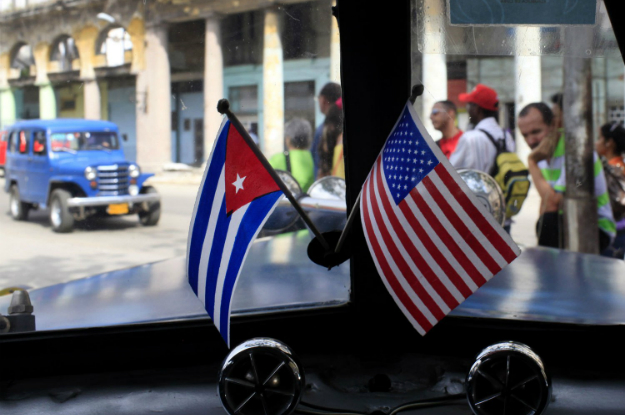Sign up here to get This Week in Latin America delivered straight to your inbox every Monday.
Cuba, Argentina Host Obama: Cuba and Argentina each play host to U.S. President Barack Obama this week, with human rights issues shading both visits. Today, Obama will hold a working meeting with Cuban President Raúl Castro, who will then host a state dinner to mark the first visit to the island by a sitting U.S. president in 88 years. On Tuesday, Obama is scheduled to meet with Cuban dissidents and entrepreneurs before flying to Argentina to meet with the recently elected President Mauricio Macri. The visit coincides with theMarch 24 anniversary of a 1976 coup that led to the Argentina’s “dirty war” from 1976 to 1983. The U.S. was initially supportive of the coup, and Obama has signaled he will take the opportunity to declasssify intelligence records from the period.
Colombia Peace Deadline: Both sides in Colombia’s three-year-old peace negotiations have suggested they will not meet a self-imposed March 23 deadline for a final deal. Government and FARC representatives have struggled to finalize agreements on disarmament, ceasefire and the official end of the conflict, and public opinion has swelled in opposition to the peace process in recent weeks. Still, the talks will almost certainly be extended and most observers believe a final deal is on the horizon. Secretary of State John Kerry is slated to meet on Monday with negotiators in Havana, where both sides will try to agree this week to a revised timeline for concluding the talks.
Venezuela’s Long Holiday: President Nicolás Maduro is calling on workers to take an extended vacation this week in an effort to save electricity. A prolonged drought has slashed output at the country’s hydroelectric dams and added political pressure on Maduro’s government. Maduro already implemented a water rationing plan in January and warned that the country’s ongoing economic crisis could last into 2017; some analysts speculate that he won’t hold onto office that long. High crime, a projected 720 percent inflation rate and the risk of default have strengthened calls for his resignation from the opposition-controlled legislature.
Chile Workers Strike: Members of Chile’s largest labor group will march in Santiago Tuesday as a major labor reform package is debated in Congress. The CUT, an umbrella union group, has called a general strike to encourage lawmakers to expand collective bargaining rights and make it harder to replace striking workers. They have also tied their protest to calls for a new constitution and changes to the country’s pension system. Businesses, particularly in the country’s mining sector, are bracing for higher labor costs should the reform package be approved.
Lula’s Future: Brazil’s Supreme Court is expected to resolve a volatile dispute over former President Luiz Inácio Lula da Silva’s appointment to become chief of staff to current president Dilma Rousseff. A final decision either way is likely to set off more protests in Brazil, where 68 percent of the country now supports the ouster of Rousseff, whose coalition appears to lack the votes to block her impeachment in the Senate. A lower house committee’s first meeting on impeachment is today.
Economy in Brief
Ecuador’s President Rafael Correa says he will raise taxes on cigarettes, alcohol and sugary drinks in part to compensate for falling oil revenues.
Mexico’s central bank kept its key interest rate at 3.75 percent at a meeting on Friday, citing a strengthening peso.
The Hong Kong-based developer of Nicaragua’s struggling canal project says it will begin preliminary construction as early as August.






